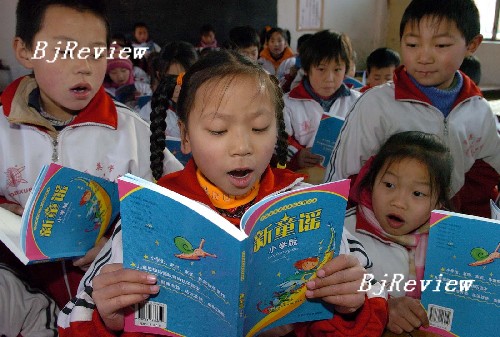
The private school for rural migrant workers' children that was established by Zhang Gezhen in Beijing has bitterly survived the many clampdowns on such schools over the past nine years. Zhang's motive is quite simple: to enable migrant children to afford education in urban areas.
"Migrant schools are what the disadvantaged groups use to save themselves in terms of education during the transition period when the planned economy is giving way to a market economy and the rural population is flocking to cities," said Zhang.
He came to Beijing for work in 1995. The first thing he did was to find a school for his child. He contacted dozens of public schools, all of which required him to hand over a considerable sum of money called a "patronage fee" because his child did not have a Beijing hukou (registered residence). The least expensive "patronage fee" was two color television sets. Zhang finally bought two TV sets for 8,500 yuan to give to the school and then his child was enrolled.
It was after this terrible experience that Zhang had the idea of starting a school for the children of migrant workers like him. The next year he started the preparatory work and in 1997 his school was founded. In its first year the school had only 53 students but the number rocketed to 500 in the second year. In 1999, Zhang opened branch schools in Fengtai, Daxing and Chaoyang districts. At the peak, Zhang had seven schools. Following Zhang's footsteps, migrant schools in Beijing sprang up like mushrooms.
But many of these schools are too small, too poorly equipped and don't have the license granted by the government. By April 2004, the Fengtai District closed down 79 schools, including Zhang's schools there. To dodge the cleansing, some migrant schools were frequently relocated. One of the schools moved eight times in just three years.
The turning point came in September 2003 when the Beijing Municipal Government ruled that rural children could enjoy the same education treatment as urban children when they go to public schools. After this policy was initiated, the Daxing District promised that public schools there would receive an 80 yuan bonus for each migrant child they accepted.
In 2003, Zhang's Mingyuan Migrant School gained the first license in Beijing to operate such a school. And in 2004 the school received a special gift from the municipal government-100,000 yuan in funding-which makes Mingyuan the first migrant school in Beijing to receive a government subsidy.
According to statistics from the Beijing education authorities, the city has around 370,000 migrant children, 239 unauthorized schools and a total enrollment of 95,092 students.
Zhang understands the government's move to close down migrant schools and he thinks such schools will sooner or later cease to exist, given the increasing educational opportunities for rural children provided by public schools. But Zhang still thinks the clampdown is going a bit too far and the best way is to gradually transfer some of the rural children to public schools while rectifying the substandard migrant schools.
| 